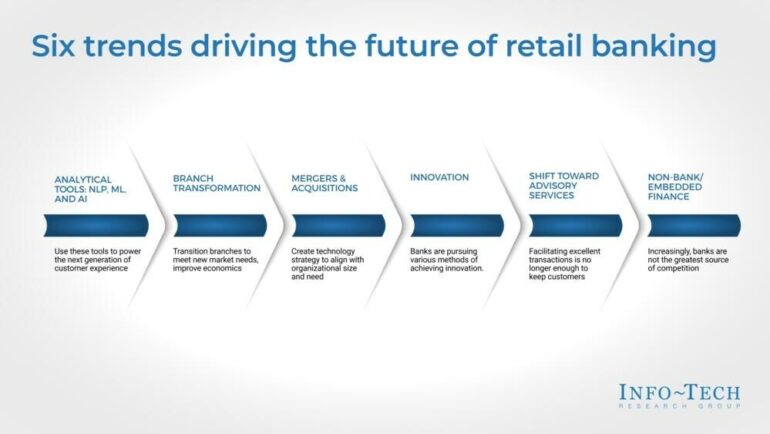TL;DR:
- Retail banks face intense competition and the need to enhance customer experiences across various channels.
- Info-Tech Research Group’s latest research highlights the importance of advanced technologies like AI and ML in the banking industry.
- Retail banks should reassess their IT operating models, implement robust governance practices, evolve core IT capabilities, and embrace business alignment approaches.
- Adoption of analytical tools, branch transformation, understanding the economics of retail banking, fostering innovation, shifting toward advisory services, and addressing non-bank players are key recommendations.
- Leveraging AI and advanced technologies can help retail banks revolutionize customer experiences and drive sustainable growth.
Main AI News:
In the fiercely competitive landscape of retail banking, financial institutions are under immense pressure to enhance and streamline customer experiences across multiple channels, including in-branch, online, mobile, and call centers. However, the rapid advancements in technology pose significant challenges for organizations, especially when faced with larger competitors armed with cutting-edge solutions and substantial resources. Striking a balance between limited budgets and escalating business demands further adds to the complexity.
To assist IT leaders in the banking industry in meeting customer expectations head-on, Info-Tech Research Group, a renowned global IT research and advisory firm, has conducted groundbreaking research titled “The Future of Retail Banking.” This comprehensive resource sheds light on the growing necessity of advanced technologies to identify and capitalize on new opportunities within the current business landscape. Achieving alignment between the business objectives and IT strategies mandates retail banking organizations to adopt agile techniques, scale governance, and establish efficient communication strategies.
David Tomljenovic, the principal research director in the financial services industry practice at Info-Tech Research Group, highlights the transformative nature of retail banking. He emphasizes the importance of adopting advanced technologies like natural language processing (NLP), artificial intelligence (AI), and machine learning (ML) to forge trust with customers and deliver exceptional services.
In order to stay competitive amidst the evolving banking industry, Info-Tech advises IT leaders in retail banks to implement four key strategies outlined below:
- Rethink the IT operating model to optimize resource allocation.
- Implement robust governance practices to ensure alignment with business priorities.
- Evolve core IT capabilities to meet the changing demands of the industry.
- Embrace business alignment approaches, such as DevOps and Agile, to enhance communication and empower IT to effectively achieve business goals.
Info-Tech’s research emphasizes the significance of adopting a forward-looking approach in the banking sector, particularly in light of the existing retail bank offerings, services, procedures, and operational frameworks that were primarily established before the Internet revolution. Consequently, it is crucial for retail banks to synchronize their strategies with emerging trends that shape the future of retail banking. These trends, along with the firm’s corresponding recommendations, are as follows:
- Analytical Tools: Harness the power of NLP, ML, and AI to gain deeper insights into customers’ needs, intent, and emotional states, fostering stronger brand connections.
- Branch Transformation: Adapt to changing client needs by transforming the role of branches, nurturing deeper relationships, and delivering exceptional client experiences.
- Mergers & Acquisitions: Gain a comprehensive understanding of the economics of retail banking. IT leaders in retail banking must familiarize themselves with the intricate financial dynamics of the business.
- Innovation: Cultivate innovation through unconventional approaches, taking into account factors such as size, maturity, customer demographics, and product offerings as key drivers of transformative change.
- Shift Toward Advisory Services: Evolve into trusted partners and advisors, acknowledging that simply facilitating transactions with speed, ease, or convenience is insufficient to retain customers.
- Non-Bank/Embedded Finance: Proactively identify and address the threats posed by non-bank players who are rapidly innovating and disrupting the industry.
Digital business models operate on unique financial assumptions and cost structures. Info-Tech suggests leveraging these transformative technologies to ensure the profitability of low- or no-fee offerings, as well as other innovative products and services.
Conclusion:
The research conducted by Info-Tech Research Group underscores the critical role of artificial intelligence and advanced technologies in the retail banking sector. Retail banks must embrace these innovations to stay competitive and meet evolving customer expectations. By reassessing their IT operating models, implementing robust governance practices, and evolving core IT capabilities, banks can align their strategies with changing industry demands.
Furthermore, the adoption of analytical tools, branch transformation, understanding the economics of retail banking, fostering innovation, shifting toward advisory services, and addressing non-bank players are vital steps for success. The market implications are clear – banks that proactively leverage AI and advanced technologies will have a competitive edge, delivering superior customer experiences and securing long-term profitability in the dynamic retail banking landscape.

